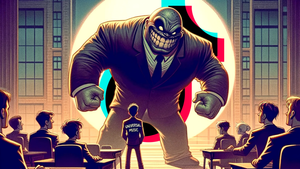TikTok’s contract that allows it to use content from Universal Music expires today. In an “open letter to the artist and songwriter community”, UMG has made it clear that the current terms proposed by TikTok to renew that contract are not acceptable. Tiktok, says the letter, wants to “intimidate” Universal into “conceding to a bad deal that undervalues music and shortchanges artists and songwriters as well as their fans”. The music company then bluntly adds that “we will never do that”.
To use music content from Universal and other music companies, TikTok requires a licence, the contract that sets out the relationship between the social media giant and the music companies it works with. Typically, those sorts of contracts are negotiated and renewed before they expire. Warner Music Group, for example, announced its “first-of-a-kind expanded agreement” with TikTok back in July 2023.
For the negotiations between Universal and TikTok to have come right down to the wire - and the breakdown in those negotiations to be exposed so starkly by Universal’s letter - shows just how far apart the two companies are, and how badly the negotiations have faltered.
Negotiations have apparently stalled over three key terms: “appropriate compensation” for TikTok’s use of music and “protecting human artists from the harmful effects of AI”, but also TikTok’s wider stance on “online safety for users”.
The extent of the breakdown in negotiations is made clear in Universal’s letter, which makes the startling accusation that TikTok attempted to “bully” Universal into accepting a new deal worth less than its previous deal. That deal proposed by TikTok was “a fraction of the rate that similarly situated major social platforms pay” and “far less than fair market value” that did not reflect the “exponential growth” and success that TikTok has seen.
According to a recent investigation by the FT, TikTok’s success has seen parent company ByteDance generate $29 billion in revenue in the three months to 30 Jun 2023, and a cash pile of “more than $50 billion”. That, says UMG, has “been built in large part on the music created by our artists and songwriters”.
If the two companies are not able to agree new terms, then Universal’s ultimate gambit would be to pull its entire catalogue - or the most popular tracks in its catalogue - from TikTok. This would leave the platform - and its users - without access to a large number of popular tracks that are widely used in TikTok content around the world. Whether that would ultimately benefit Universal - or harm TikTok - is unclear.
On one hand there is a clear pattern of increased consumption on “premium” music services like Spotify and Apple Music linked to tracks being used on TikTok. However, on the other hand, a Bloomberg study from March 2023 showed that TikTok saw a drop in users in Australia when the platform “limited the music some people could put in their posts” which, said Bloomberg, suggested that TikTok is “still dependent on its access to popular songs”.
Universal clearly believes that music is a core part of TikTok’s value proposition to consumers, saying that “the majority of content on TikTok contains music” and that the platform “is trying to build a music-based business, without paying fair value for the music” it uses.
As part of the negotiations for the onward licence, says Universal, TikTok proposed “a rate that is a fraction of the rate” that it gets from other social media platforms. But this is not just a question of cold hard cash. Or, at least, while it might really be a question of cold hard cash, Universal is prepared to go to war on other fronts to get the money it wants.
Referencing its ‘artist-centric’ drive to “update streaming’s remuneration model and better reward artists for the value they deliver to platforms”, UMG says that there were three key issues that it wanted to be resolved as part of its onward contractual negotiations with TikTok. One of these, online safety, does not directly impact on the amount of money Universal gets, but does have wider implications for both users and Universal artists.
There is no dispute that TikTok has a content moderation problem. In a 2023 article published by The Conversation - a publication that specialises in bringing journalists and academics together - Nuurianti Jalli, a professor of communication studies at Northern State University, said “research has found TikTok has a role in facilitating the spread of hate speed as well as misinformation and disinformation” including “ethnoreligious propaganda”.
TikTok has offered no solutions to this “rising tide of content adjacency issues”, says Universal, going on to argue that alongside widespread copyright infringement - which TikTok seems indifferent to, it claims - there is a “tidal wave of hate speech, bigotry, bullying and harassment on the platform”.
While the heart of Universal’s complaint is money, as with its change to Spotify’s terms, the company is shrewd enough to realise that a multi-billion dollar global music giant shouting loudly about wanting more money is unlikely to get it much sympathy.
With Spotify, Universal shifted the discussion to one of streaming fraud and functional audio - and then successfully pressured Spotify to demonetise millions of tracks created by independent music creators, with no consultation with organisations representing those creators. With Apple Music, the focus is on higher quality music and a ‘bonus’ for labels and artists who provide content as spatial audio.
By using the online safety argument alongside its demands for more money - which includes TikTok putting a stop to AI-generated music diluting the royalty pool - Universal cleverly aligns itself with an issue currently concerning governments, creators and users alike.
If the pay off from its negotiating tactics is more money in Universal’s pockets then artists and shareholders will benefit. Will Universal continue its battle for online safety and reduced “hate speech, bigotry, bullying and harassment” if its negotiations over money are successful? Only time will tell.

